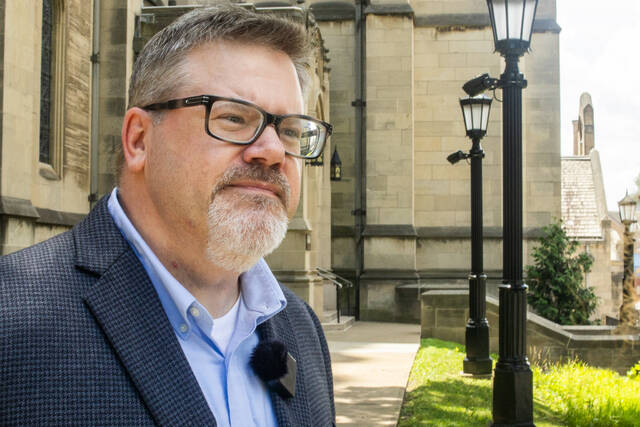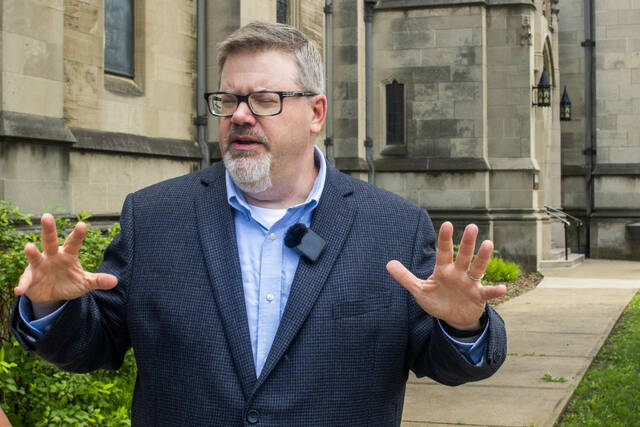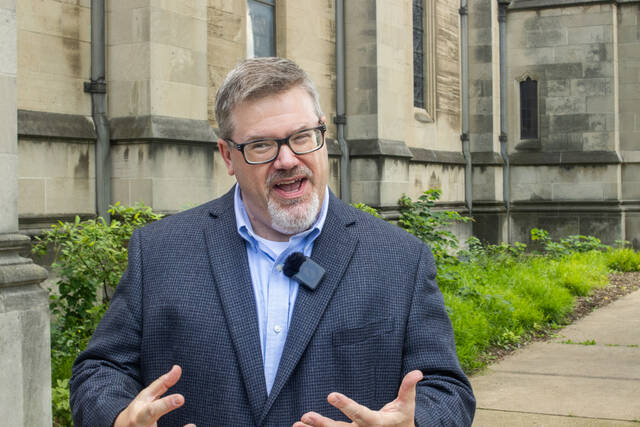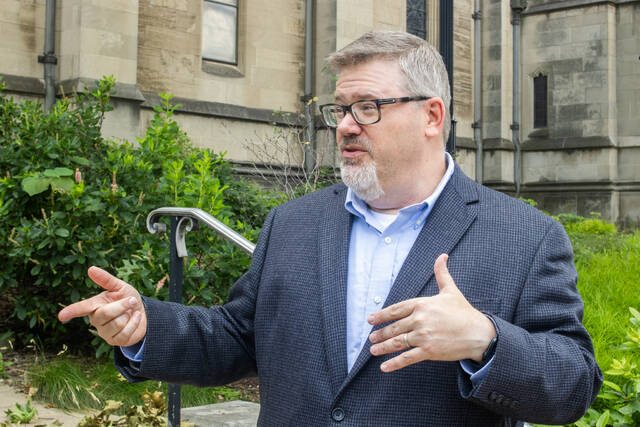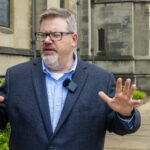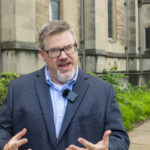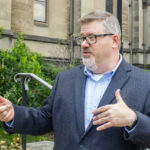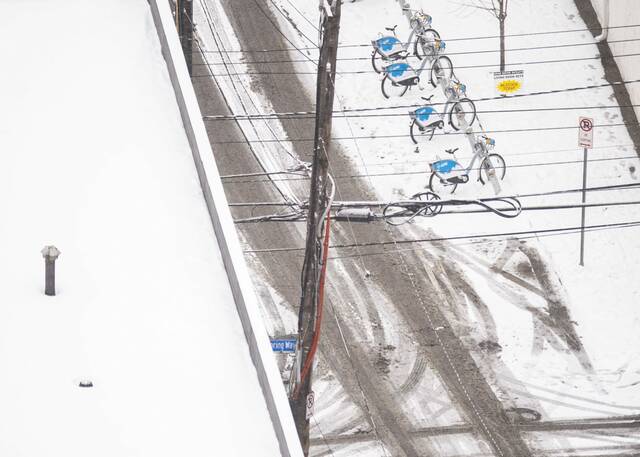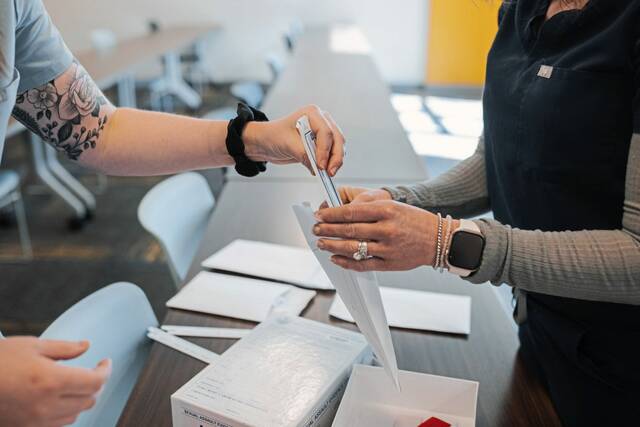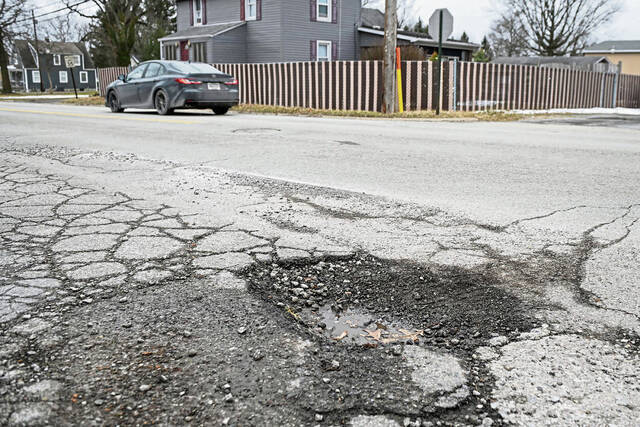Abagail Hayward doesn’t talk about politics with certain friends.
It’s not because she’s unable to share her beliefs or respect other ideologies. She just doesn’t want to lose friends because of the tense nature of such conversations.
“I know how they stand, and I don’t want them to not like me because of the way everything is,” said the master’s degree candidate at Duquesne University.
To a college student, this is normal.
From the stereotype of having political fights during Thanksgiving dinner to social media comment section “wars,” the neglect of civil discourse saturates our culture, often with the expectation that younger generations aren’t able to put aside differing beliefs to hold civil, productive conversations.
Kevan Yenerall, professor of criminal justice, history and politics at PennWest University, hopes to change that.
He saw the lack of constructive debates among college-age students and now teaches a Civil Discourse and Difficult Conversation class that addresses the issue. This class, offered at all three PennWest branches, teaches students not only to navigate controversial topics, but to demonstrate constructive modes of interaction.
“There’s leeway given to people in these different disciplines as to how they teach it. But the description and the core of the class is the same (at PennWest). And that is to be able to have conversations in a constructive way that fosters critical thinking, and that allows us to have discussions that are constructive, that lend themselves to not screaming at each other, that goes against ad hominem attacks,” Yenerall said.
Choosing when and how to have a controversial conversation is complex, as one has to factor in the difficulty of the topic, the reaction and background of the other person, and the energy one is willing to expend during a debate.
Just last week, following the assassination of conservative activist Charlie Kirk, Yenerall decided to pivot part of his class to educate his students on political violence and how to gather reliable information.
“Sometimes political violence can be easily attributed to a specific ideology,” he said. “It’s important to make a distinction between random people online and an ideology.”
Yenerall plans to have another assignment following his lecture where students will have the opportunity to write and discuss Kirk’s death.
Austin Wise, a political science major at the University of Pittsburgh and president of Pennsylvania’s College Democrats, knows all about that. He has years of experience with having political discussions, from cold-calling to door knocking, and he finds ways to relate and discuss politics with almost anyone.
“I don’t believe in academic elitism or political elitism. Most Americans understand a few key things, and that’s that they can’t afford to live, eat, get to work, afford an education,” Wise said. “… When you bring it down to the bread-and-butter issues, and you’re not talking about ultra-specific regulatory efforts or ultra-specific interpretations of the law, the average American doesn’t understand that, but they understand those key things.”
The civil discourse class at PennWest takes that basic premise and converts it into a step system based on self-understanding through self-questioning.
Students must be able to define politics and recognize they are the source of possible antagonism, Yenerall said. Students learn about political socialization and how that influences their belief system, what political party they belong to and why they hold a specific belief. Then, they can analyze news reports for substance, peer review and category. They must learn to justify their position using peer-reviewed information.
“Our Civil Discourse and Difficult Conversations course, which is offered as a general education option, reflects that commitment,” said James Fisher, interim provost and vice president for academic affairs at PennWest. “It creates space for students to explore differing viewpoints, practice respectful dialogue, and develop the skills to listen, reflect and respond with empathy and critical thinking. Especially in today’s polarized climate, these experiences are essential.”
Under the First Amendment, public colleges and universities are required to allow free speech on campuses, but that does not guarantee the same rights to students enrolled in private universities.
Witold “Vic” Walczak, legal director of the American Civil Liberties Union of Pennsylvania, said civil discourse is essential to learning because it conveys a “marketplace for ideas.”
Without debate, Walczak said, everyone gets “brainwashed” to think the same.
“Colleges and universities are the ultimate place for young people to have vigorous debate,” Walczak said. “If that’s not civil, then it’s not going to be effective.”
The civil discourse class teaches that conflict and disagreement are crucial to being able to have constructive conversations, and learning how to have those conversations is what keeps personal relationships alive despite the disagreement.
“I don’t put those walls up with people because, at the end of the day, we built something together before, for years and years,” Wise said. “I’m not going to throw that away because you disagree with one decision I’m making in my life, just as I disagree with you and probably other people. I’m not going to cut you off just for that. Life is too short.”
As far as State System of Higher Education officials know, PennWest and Slippery Rock University, which offers an introductory civil discourse and democracy course, are the only universities in Pennsylvania that offer a class specifically targeted to civil discourse.
However, other Western Pennsylvania colleges also have programs designed to foster civil discourse.
Duquesne University has been hosting a civil discourse event series since 2017. The University of Pittsburgh’s Office of the Provost designated the 2023-25 academic years with a campuswide initiative called the “Year of Discourse and Dialogue.”
And Chatham University provides students with a handbook on how to engage in civil discourse.
Alison Dagnes, a political science expert and professor at Shippensburg University, said the main issue is the dominating stereotype that all schools have a large student population participating in activism and protests on campus. Dagnes said, in fact, many smaller public regional universities lack discourse because they are not as elite as larger private colleges that typically host political figures.
To combat this problem and get students to engage in her classes, she hosts “political speed dating.”
During these exercises, students with opposing political views are each given two minutes to share their personal opinions and then spend the last two remaining minutes finding common ground.
Dagnes said the activity works, and many of her students leave the class with a new friend despite differing politics.
“It’s really hard to hate up close,” Dagnes said.
Dagnes also has her students participate in Unify America’s College Bowl, which is a virtual intercollegiate event where thousands of students are paired into one-on-one conversations across the political spectrum.
Similarly, Yenerall’s class shows students the way to common ground, something he says is becoming increasingly rare in our society.
“It’s their mother, it’s their father, it’s their cousin. It’s their lives. It’s the people they know in the military. It’s the people they know who have been discriminated against as people. They can’t afford basic necessities of life in America,” Yenerall said. “So we need more of it. More politics, not less. More political institutions, not fewer. More discussion of news sources and more subscriptions to newspapers, not less.”
Aaliyah Dittman, a political science major at PennWest Clarion, took Yenerall’s class. In it, she found time to reflect and write out what she thought, not try to sort through her feelings in the chaos of the internet, where information is boundless and often less than reliable.
“It’s easy to hate a group of people if you don’t have experience,” Dittman said. “If you’re not able to interact with someone who’s having an issue, it’s hard to be empathetic toward that issue in general.”


